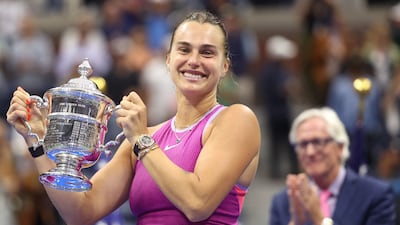There was a growing sense of inevitability over the past two weeks that the US Open trophy would eventually end up in the clutches of Aryna Sabalenka. So it proved inside Arthur Ashe Stadium on Saturday night as the Belarusian world No 2 held off a spirited Jessica Pegula 7-5, 7-5 to win her third Grand Slam title.
Aside from a slow start to her third round, in which she lost the opening set 6-2 to Ekaterina Alexandrova (before ultimately bulldozing the Russian), Sabalenka was imperious in New York. It was the only set she dropped throughout the Flushing Meadows fortnight, dominating in-form players and Olympic champions on her way to the trophy.
For a player blessed with her power, talent, and tools, Sabalenka had always appeared destined to win multiple majors, although the biggest obstacle in the way was frequently herself.
Whether it was the pressure of the stage or being on the wrong side of a partisan crowd, the Belarusian had a tendency to fold in the Grand Slams; her serve and thunderous groundstrokes – the foundations of her game – would abandon her and she would struggle to pull herself out of mid-match ruts. Sabalenka was already an established top-10 player before she made her first major quarter-final.
That all changed last January at the Australian Open, where Sabalenka finally got over the line to collect her first Grand Slam trophy. She followed that up by reaching last season's US Open final and was only denied the hard-court major double by an inspired Coco Gauff. Having retained her Melbourne title this season before adding the New York trophy to her collection, Sabalenka has now won three of the last four majors on hard courts.
Iga Swiatek may be the undisputed No 1 in women's tennis (the Pole leads the rankings by more than 2,600 points) but Sabalenka has established herself as the queen of hard courts.
Sabalenka's recent Grand Slam dominance is no accident. She has worked with a psychologist to better control and channel her focus, adopting a mindset based on “positive emotions”.
“Today I just kept reminding myself that this is the US Open final, of course she’s going to fight really hard for it and it’s not going to be easy, and I have to work really hard to get it,” Sabalenka said in her post-match press conference. “In those tough moments, I was just trying to stay strong and trying to remind myself that I have been through a lot and I’m strong enough to hold under this pressure.”
Sabalenka has indeed been “through a lot” and her mental resilience has been severely tested. Five years ago, her father Sergiy passed away from meningitis at just 43, and in March this year, her former boyfriend Konstantin Koltsov, once a star of the NHL, died from an apparent suicide in Miami.
While it pales in comparison, she has also dealt with injury setbacks this season. Sabalenka was struggling with a stomach problem that led to an earlier than expected exit from the French Open before skipping Wimbledon altogether with a shoulder injury.
Her North American form had been mixed leading up to the US Open, with surprise losses at the Mubadala Citi DC Open and Canadian Masters, but she hit her stride at the ideal time by winning the Cincinnati Open where she beat Pegula in the final.
“After I lost my father, it’s always been my goal to put our family name in the history of tennis,” said Sabalenka. “Every time I see my name on that trophy, I’m so proud of myself, I’m proud of my family that they never gave up on my dream and that they were doing everything they could to keep me going. I had this opportunity in life, so it really means a lot. It’s been always my dream. I still cannot believe that me with my team, we were able to achieve so much already.”
With her tennis and her mind in such a strong and settled place, Sabalenka will be aiming to achieve even more, and at 26 years old, the best could still be yet to come.

